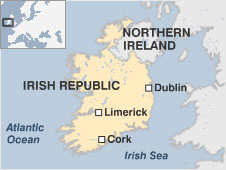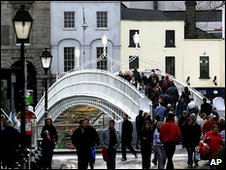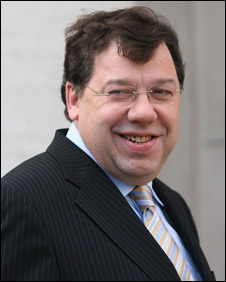 |
Ireland which is often called the Irish Republic to distinguish it from
British Northern Ireland emerged from the conflict that marked its birth as an independent state to become one of Europe's economic success stories.
Long under English or British rule Ireland lost half its population in the decades following the Great Potato Famine of the 1840s becoming a nation
of emigrants. After World War I independence from the United Kingdom was only achieved at the price of civil war and partition.
Since the country joined the European Community in 1973 it has been transformed from a largely agricultural society into a modern high-technology economy.
Overview
For centuries British dominion in Ireland gave rise to unrest which finally erupted into violence with the Easter Rising of 1916 when independence was proclaimed. The rising was crushed and many of its leaders executed but the campaign for independence carried on through a bloody Anglo-Irish War of 1919-1921.

A booming economy transformed Dublin in the 1990s
|
It was in 1922 that 26 counties of Ireland gained independence from London following negotiations which led to the other six counties part of the province of Ulster remaining in the United Kingdom of Great Britain and Northern Ireland. Partition was followed by a year of civil war.
Relations between Dublin and London remained strained for many years afterwards. Northern Ireland saw decades of violent conflict between those campaigning for a united Ireland and those wishing to stay in the United Kingdom.
In an unprecedented and concerted effort to resolve the situation the Irish and UK governments worked closely together in negotiations which led to the Good Friday Agreement on the future of Northern Ireland in 1998.
Ireland's economy began to grow rapidly in the 1990s fuelled by foreign investment. This attracted a wave of incomers to a country where traditionally mass emigration had been the norm.
The boom that earned Ireland the nickname of "Celtic Tiger" faltered when the country fell into recession in the wake of the global financial crisis of 2008.
In June 2009 the International Monetary Fund said Ireland faced the worst recession in the developed world and a struggle to bail out its banks but that the government was adopting the right tactics to get the country back on course.
Ireland is the birthplace of many famous English-language writers among them W.B. Yeats James Joyce Samuel Beckett Oscar Wilde and George Bernard Shaw.
Facts
- Official name: Ireland (Irish: Éire)
- Population: 4.5 million (UN 2009)
- Capital: Dublin
- Area: 70182 sq km (27097 sq miles)
- Major languages: English Irish
- Major religion: Christianity
- Life expectancy: 78 years (men) 82 years (women) (UN)
- Monetary unit: 1 euro = 100 cents
- Main exports: Machinery and equipment chemicals foodstuffs
- GNI per capita: US $49590 (World Bank 2008)
- Internet domain: .ie
- International dialling code: +353
Leaders
President: Mary McAleese
Mary McAleese won direct elections in 1997 becoming the country's first Northern Ireland-born head of state.
She was returned to office unopposed in 2004 when she resolved to strive for "resilient communities" during a time of rapid change for the country.
Irish presidents have a mainly ceremonial role.
Prime minister: Brian Cowen
Brian Cowen succeeded Bertie Ahern as Taoiseach (prime minister) and leader of the Fianna Fail party in May 2008. Mr Ahern had announced his resignation the previous month after a controversy over his financial affairs.

Brian Cowen was sole nominee to succeed Bertie Ahern
|
Political observers had long tipped Mr Cowen as a successor to Mr Ahern. His position was strengthened when he took over as Fianna Fail deputy leader in 2002 and finance minister in 2004 - often seen as a stepping-stone to the premiership. He became deputy prime minister (Tanaiste) after the 2007 general election.
When Mr Ahern stepped down Mr Cowen was the sole nominee to succeed him.
As foreign minister in 2000-2004 Mr Cowen had a high-profile role in the Northern Ireland peace process and took Ireland into UN Security Council membership and the presidency of the European Council.
The son of a long-standing Fianna Fail member of parliament and publican from the rural seat of Laois-Offaly he succeeded his late father as member of the Dail lower house of parliament at a by-election in 1984 at the age of 24. He entered the cabinet as labour minister in 1992 and held a succession of posts from then on.
Media
Public broadcaster Raidio Teilefis Eireann (RTE) dominates the radio and TV sector. It provides a comprehensive service in English and Irish.
TV3 the main commercial TV station opened in 1998.
Competition for domestic broadcasters comes from British public and private terrestrial TV channels. Satellite stations including those carried by Britain's BSkyB are widely available. There is extensive take-up of cable TV.
The Irish print and broadcast media operate freely within the confines of the law. Broadcasting - commercial and public - is regulated by the Broadcasting Authority of Ireland. The Competition Authority safeguards against unfair competition in the press sector.
Cross-media ownership is permitted within limits - press groups may own up to 25% of local radio and TV stations.
Ireland plans to launch digital terrestrial TV and aims to switch off analogue TV transmissions in 2012.
The press
- The Irish Times - national daily
- Irish Independent - national daily
- Irish Examiner - Cork-based national daily
Television
- RTE - public operates RTE 1 RTE 2
- TG4 - public Irish-language
- TV3 - national commercial; also operates cable/satellite service 3e
Radio
- RTE - public operates flagship station Radio 1 pop music station 2 FM Irish-language Raidio na Gaeltachta classical and cultural station Lyric FM and digital-only services
- Today FM - national commercial
-
Newstalk - semi-national commercial
AFRICA | ASIA-PACIFIC | AMERICAS | EUROPE | MIDDLEEAST | SOUTHASIA
Mauritania Mauritius Morocco Mozambique Namibia Niger Nigeria Republic-of-congo Rwanda Sao-tome-and-principe Senegal Seychelles Sierra-leone Somalia South-africa Sudan Swaziland Tanzania The-gambia Togo Tunisia Uganda zambia Zimbabwe Australia Brunei Burma Cambodia China East-timor Fiji Indonesia Japan Kazakhstan Kiribati Kyrgyzstan Laos Malaysia Marshall-islands Micronesia Mongolia Nauru New-zealand North-korea Palau Papua-new-guinea Samoa Singapore Solomon-islands South-korea Taiwan Tajikistan Thailand The-philippines Tonga Turkmenistan Tuvalu Uzbekistan Vanuatu Vietnam Antigua-and-barbuda Argentina Bahamas Barbados Belize Bolivia Brazil Canada Chile Colombia Costa-rica Cuba Dominica Dominican-republic Ecuador El-salvador Grenada Guatemala GuyanaHaiti Honduras Jamaica Mexico Nicaragua Panama Paraguay Peru St-kitts-and-nevis St-lucia St-vincent-and-the-grenadines Suriname Trinidad-and-tobago United-states-of-america Uruguay Venezuela Albania Andorra Armenia Austria Azerbaijan Belarus Belgium Bosnia-hercegovina Bulgaria Croatia Cyprus Czech-republic Denmark Estonia Finland France Georgia Germany Greece Hungary Iceland Ireland Italy Latvia Liechtenstein Lithuania Luxembourg Macedonia Malta Moldova Monaco Montenegro Norway Poland Portugal Russia San-marino Serbia Slovakia Slovenia Spain Sweden Switzerland The-netherlands Turkey Ukraine United-kingdom Vatican Algeria Egypt Iran Iraq Israel-and-palestinian-territories Jordan Kuwait Lebanon Libya Mauritania Oman Saudi-arabia Sudan Syria Tunisia United-arab-emirates Yemen Afghanistan Bangladesh Bhutan India Nepal Pakistan Sri-Lanka The-Maldives

